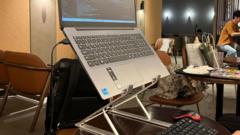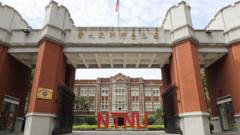The booming trend of 'Cagongjok'—students and workers occupying cafe spaces for extended periods—pressures South Korean cafes to adapt. Some are enforcing guidelines while others embrace the phenomenon, highlighting the cultural implications of this evolving workspace alternative.
South Korean Cafes Navigate the Rise of Student 'Cagongjok' Culture

South Korean Cafes Navigate the Rise of Student 'Cagongjok' Culture
As students flock to cafes for study sessions, South Korean establishments find themselves balancing customer needs and space limitations.
In affluent neighborhoods of Seoul, the growing number of cafes is witnessing a cultural shift driven by young patrons known as 'Cagongjok.' This term denotes individuals who belong primarily to the youth demographic, keen to utilize cafes as their study or workspaces. Hyun Sung-joo, a cafe owner in Daechi, recently reported an incident where a single customer monopolized a power outlet with two laptops and a six-port charger, prompting him to restrict power access.
In South Korea, cafes have emerged as popular study spots, more so than in many Western countries, leading to a saturation of customers working in shared spaces, especially close to educational institutions. The trend has drawn attention from major chains like Starbucks, which has instituted new guidelines to address excessive usage of space by a small fraction of customers. These include elaborate setups such as dual laptops, monitors, and unattended tables—issues highlighted during peak study times.
Despite these restrictions aimed at encouraging a balanced environment, a significant portion of the brainstorming students, often referred to as 'Cagongjok,' still frequents Starbucks and similar establishments. A consistent presence is noted in many cafes, where students can be seen pouring over their laptops and textbooks from morning until night.
While many patrons appreciate the new rules for making space more available for conversation and leisure, some critics argue it marks an unwarranted shift from previous cafe policies that allowed for longer usage without scrutiny. South Korea's cafe culture, intertwined with the explosive growth in franchise coffee outlets, indicates a complex relationship with student behavior and cafe operations.
Independent cafes take varied approaches to managing the situation. Some owners, like Hyun, express that most customers are respectful and occasionally purchase additional drinks if staying for extended periods. Others have implemented stricter rules, opting for time limits on studying to alleviate crowding issues.
Yu-jin Mo, a former foster child, highlights a significant reason young people prefer cafes: they provide a sense of safety and warm ambiance absent in traditional study environments like libraries. The shift towards cafe-centric studying reflects broader societal pressures in South Korea: job insecurity, academic rivalry, and insufficient public spaces contributing to changing study habits among youth.
Professor Choi Ra-young, an educational researcher, posits that 'Cagongjok' reflects deeper societal structures, stating, "They are products of social conditions that fail to accommodate adequate workspaces." As discussions around integrating cafe spaces into academic culture evolve, the call for developing environments that support studying while ensuring orderliness becomes increasingly relevant.
In South Korea, cafes have emerged as popular study spots, more so than in many Western countries, leading to a saturation of customers working in shared spaces, especially close to educational institutions. The trend has drawn attention from major chains like Starbucks, which has instituted new guidelines to address excessive usage of space by a small fraction of customers. These include elaborate setups such as dual laptops, monitors, and unattended tables—issues highlighted during peak study times.
Despite these restrictions aimed at encouraging a balanced environment, a significant portion of the brainstorming students, often referred to as 'Cagongjok,' still frequents Starbucks and similar establishments. A consistent presence is noted in many cafes, where students can be seen pouring over their laptops and textbooks from morning until night.
While many patrons appreciate the new rules for making space more available for conversation and leisure, some critics argue it marks an unwarranted shift from previous cafe policies that allowed for longer usage without scrutiny. South Korea's cafe culture, intertwined with the explosive growth in franchise coffee outlets, indicates a complex relationship with student behavior and cafe operations.
Independent cafes take varied approaches to managing the situation. Some owners, like Hyun, express that most customers are respectful and occasionally purchase additional drinks if staying for extended periods. Others have implemented stricter rules, opting for time limits on studying to alleviate crowding issues.
Yu-jin Mo, a former foster child, highlights a significant reason young people prefer cafes: they provide a sense of safety and warm ambiance absent in traditional study environments like libraries. The shift towards cafe-centric studying reflects broader societal pressures in South Korea: job insecurity, academic rivalry, and insufficient public spaces contributing to changing study habits among youth.
Professor Choi Ra-young, an educational researcher, posits that 'Cagongjok' reflects deeper societal structures, stating, "They are products of social conditions that fail to accommodate adequate workspaces." As discussions around integrating cafe spaces into academic culture evolve, the call for developing environments that support studying while ensuring orderliness becomes increasingly relevant.



















